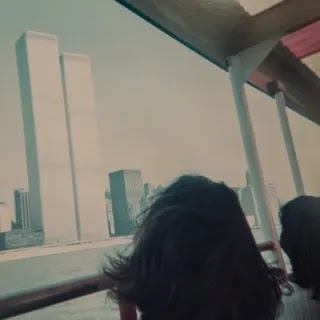While revisiting a treasured childhood TV show, the amber-voiced songwriter reaches back for the psychedelic majesty of his work with the late Richard Swift.
Damien Jurado had been making records with assorted musicians for a dozen years before he made his first one with the producer Richard Swift, in 2010. They became instant creative foils and deep companions, cutting cover collections and bonding like brothers. Two essential things happened to Jurado’s music, too: First, Jurado—whose fragile tales of peripatetic loners and soft-spoken losers were sometimes decorated only by his murmured falsetto—began enjoying the process. “I just love being in the studio,” he said after finishing their fourth LP together. “Before I met Richard … I hated it.” That discovery, in turn, sparked one of the most staggering streaks of any American singer-songwriter during the previous decade. From 2010’s expansive but cozy Saint Bartlett to 2016’s dioramic Visions of Us on the Land, Jurado’s four collaborations with Swift framed the high stakes of his characters’ low situations with perfect psychedelic drapery. If Jurado’s earlier works felt like scenes from a curious movie written but not yet made, these records were the whole picture show, tenderly conceptualized and vividly rendered.
But in their final conversation before Swift died in July 2018, he cut Jurado loose, telling the songwriter he was now ready to helm his own records. That cut cord was a gift: Jurado’s self-produced The Horizon Just Laughed may well be a career acme, the joy he found alongside Swift now applied by a songwriter able to match music to his images. Jurado has since been recording at a feverish pace, releasing a new album each of the last five years, with seven more reportedly in the queue as of June 2021. The new Reggae Film Star, however, suggests an awkward oxbow in Jurado’s catalog, as though he’s uncertain about how to proceed with self-production. After a series of largely spare and ultimately resilient records following Swift’s death, he seems to be reaching back for the magic he found with his old friend Swift—and, kind of tragically, rarely connecting.
The writing, at least, is often remarkable. Jurado’s songs have often presented elliptical portraits of people trying to overcome dire circumstances—a lovelorn ode to a kidnapped kid trying to make it home to her mother in “Ohio,” an aging artist interrogating his life choices through “Fool Maria.” Likewise, Reggae Film Star threads together the unobserved indignities that often accompany a creative pursuit. Jurado has long talked about his enduring love of the B movies and daytime television of his childhood. “That was my mainline to whatever America is,” he has said, noting they were a constant companion while his family pinballed around the United States. These dozen vignettes stitch together bits of the lives that such characters lead offscreen: the mental toil of an actor doing endless takes of their own death, the tedious repetition of life on set, the creative partners trying to let one another go.
Jurado plucks liberally from the universe of the late-’70s sitcom Alice for these songs. The show—about a widow, Alice, who moves to Phoenix with her son, Tommy—must have resonated with the preteen on the move. The writers, characters, and circumstances have cameos, but you don’t need to know ’70s CBS programming to see pieces of your own puzzle here. Maybe you’ve been sad and shopping for groceries when a song plays overhead, suddenly crystallizing your whole emotional saga, as happens in opener “Roger.” Or maybe you’ve had to work some mindless job just to try and find time and money to pursue the creative passion that actually fulfills you, as with the actor doing commercials to earn a living during the heartrending “Whatever Happened to the Class of ’65.” Jurado is a master of opening a window on once-hidden difficulties, his ambered voice inviting you in to understand; the world he exposes during Reggae Film Star is strange and compelling, like a reality TV show filmed behind the scenes of a sitcom.
The accompaniment for these curious lyrical snapshots, though, never rises to meet their idiosyncrasy—it is often bland enough to distract from them. The piano runs throughout “Roger’s Audition” feel like mere plug-ins, never supporting the story of a man at the brink of madness. The faintly motorik rhythm section and chromatic keyboards of “Taped in Front of a Live Studio Audience” disrupt the mystery and danger in the exchange between former lovers. The severe self-doubt that pools inside of finale “Gork Meets the Desert Monster” is met by straightforward strings and predictable vocal effects; it’s almost impossible not to imagine the fun Swift would have had with this sad character study, animating these neuroses in broken pastel washes. Jurado and longtime multi-instrumental collaborator Josh Gordon can suggest that majesty, but never muster it.
It is callous, maybe even mean, to wonder how these songs would sound with Swift, to imagine him once again turning Jurado’s sketches into vivid dramas. You can hear his faded traces in the prismatic harmonies and piano flourishes; Swift’s musical ghost slinks through Reggae Film Star, here in spirit but unable to wield the controls. That’s OK: Despite his prolific pace, Jurado’s career has been a series of slow arcs. It is promising that he’s trying to reach for such arrangements again at all; he may eventually get there. That very scenario—the artistic survivor reaching across the void toward a trusted late collaborator—even seems like a scene from Reggae Film Star, a tender look into the lives of those who help give our own lives meaning.



0 comments:
Post a Comment